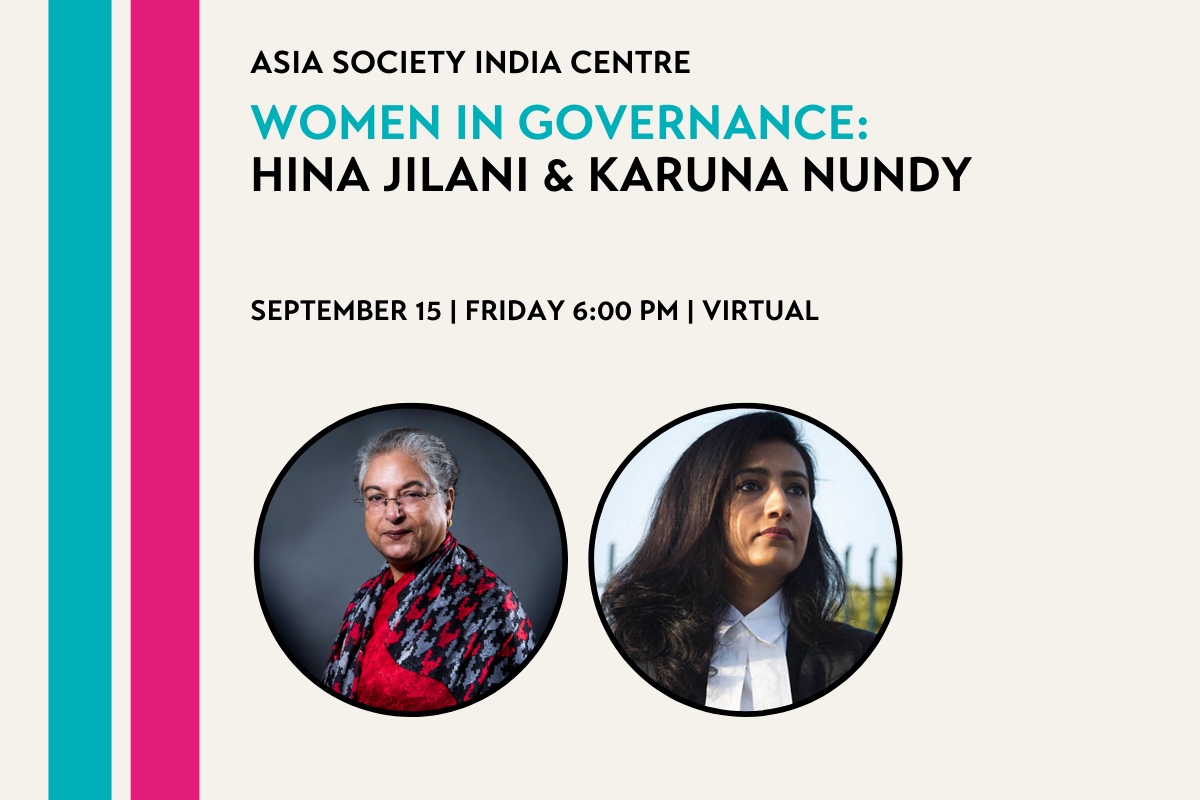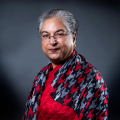Women in Governance: Hina Jilani & Karuna Nundy
VIEW EVENT DETAILSFriday, 15 September, 6:00 pm - 7:30 p.m

When Pakistani-American English professor Sara Suleri was asked what the condition of women in the Third World was, she responded simply: “There are no women in the Third World.” That is to say: women don’t exist as a category to the same extent that men do. This remains true today: only six countries have 50 per cent or more women in parliament in single or lower houses. World over, women face a disproportionately high amount of personal, social and political pressures. Women in South Asia have a unique set of compulsions and complications, ranging from unpaid care work and family interference in career choices, to more serious gender-based discrimination and violence, which affects one in three women globally.
The World Economic Forum found in 2023 that South Asia (Afghanistan, Bangladesh, Bhutan, India, Iran, Maldives, Nepal, Pakistan and Sri Lanka) scored extremely low in the index of India has never had a female Chief Justice; it was not until the 1920s that women were allowed to practice law. Having women visible in the public and personal spheres - makes a difference. It does not just inform the generations after them; but it shapes experiences, transforms lives, and defines society. Studying the role and presence of women in governance of all types – governments at all levels; private governance; and policymaking – is vital, both to understand the personal successes in their careers, and the larger political impact their work and position has had on society.
This is what motivates us in putting together our Women in Governance series – to understand the personal, political, and professional pathways laid out for women in South Asia. The first conversation, which will focus on women in law, features Hina Jilani, lawyer and chair, Human Rights Commission of Pakistan, and Karuna Nundy, Advocate, Supreme Court of India. As leading lawyers in their respective countries, both bring with them a rich body of work: shaping gender and human rights law in South Asia, and using their careers to transform the opportunities and recourses available to women and those articulating their rights. They will swap notes on India and Pakistan's legal systems, their gender and human rights work in both systems, and their motivations and personal journeys. They will also reflect on how to build stronger, more resilient, and more inclusive worlds for women in South Asia.

Hina Jilani is a prominent Pakistani lawyer and human rights advocate. She specializes in human rights and constitutional rights litigation, both in class action and individual cases. She has been invited by prominent academic institutions to teach courses on international human rights law, including University of Oxford, the University of Pennsylvania Law School and the Georgetown University Law School. In 1980 she co-founded the first all-women law firm and the first Legal Aid organization in Pakistan. She is current Chair of the Human Rights Commission of Pakistan, an NGO that she co-founded in 1986. She is also the Founding Trustee of Dastak Charitable Trust, a globally known women’s shelter and Centre for Access to Justice for women and children. She served as the Special Representative of the UN Secretary General on the Situation of Human Rights Defenders, and was member of international commissions of inquiry on serious human rights violations constituted by the United Nations. She was a member of the ICJ Eminent Jurists Panel on Human Rights and Counter Terrorism in by the ICJ in 2006. She is a member of the Elders, a group of global independent leaders established by Nelson Mandela to work for human rights, peace and democracy. She is currently serving as the President of the World Organization against Torture (OMCT). Ms. Jilani is the recipient of numerous human rights awards for her legal and human rights work internationally as well as in Pakistan and South Asia. She has been awarded the Honorary Doctorate in Laws (honoris causa) by Trinity College, Dublin in 2016 and by the Roehampton University, United Kingdom, in 2009.

Karuna Nundy is an Advocate at the Supreme Court of India and an international lawyer. She also works with governments to contribute to constitutional and legal drafting and policy. Nundy was listed by Time Magazine as one of the 100 most influential people in the world, in 2022-2023. She has been described by the BBC as a "leading lawyer" and the New York Times as a “leading civil liberties lawyer” in an article on free expression; and has been awarded for being one of the "Most Powerful Women in Business" in 2021 for her commercial dispute resolution work. Currently, Nundy serves as an expert on the Columbia Global Freedom of Expression committee and a Member of the High Level Panel on Media Freedom chaired by Lord Justice David Neuberger, and founded by Amal Clooney at the request of the governments of the UK and Canada. Nundy’s legal work includes fighting for the rights of the Bhopal gas victims, contributing to the 2013 'Anti Rape Laws' and the Right to Food Act. She has appeared in some of the most significant cases in India and was one of the lawyers who led arguments in the definitive online free speech case. She is leading arguments to criminalise marital rape and separately, to legalise queer marriage in part on grounds of freedom to express sexual preference. She has worked with the governments of Maldives, Nepal, Bhutan and Pakistan on constitutional, legal and human rights reforms. She was invited by the United Nations to advise on legal reform in 192 jurisdictions. Nundy has trained judges globally at a MOOC of the Bonavero Institute at Oxford University, on international standards required of judges when dealing with 'blasphemy' and religious hate speech. Nundy obtained a degree in Economics from St. Stephen's College, Delhi University. Her first law degree is from the University of Cambridge, England where she was awarded the Emmeline Pankhurst prize, the Amy Cohen Awards and the Becker Studentship. She then received an LLM from Columbia University, New York, where she was awarded a Human Rights Fellowship. Ms. Nundy is qualified to practise law in India and New York.
